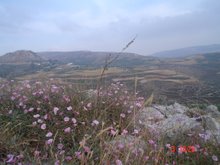Early Sunday morning, before the February 25 dawn, Israeli army bulldozers, armored personnel carriers (APCs) and jeeps began to roll into the Palestinian city of Nablus. The personnel and heavy equipment came from two military bases on either side of the valley city, from atop mountains that surround it to the south and north.
At one in the morning residents of Nablus’ impoverished Old City began to hear the noises of screeching, clunking bulldozers building make-shift walls around the medina. Large trash receptacles and cars were destroyed on top of one another, blocking all paths and roads in and out of the winding streets and alleys. According to the Palestinian Centre for Human Rights, “Soon after, [Israeli Occupying Forces (IOF)] bulldozers placed sand barriers and cement blocks in the middle of Faisal Street in the east of the city, dividing the city into two parts. IOF then besieged the National Hospital in the center of the city and Rafidya Hospital...”
Soon after they had sealed the city, the Israeli army exercised their control of the electro-magnetic waves by interrupting local television and radio broadcasting. The local news was stopped short by a broadcast from a commanding Israeli military official, who told viewers and listeners to stay inside their homes. Under no circumstances, he said, were civilians to go to the street. The total curfew, he said, would keep the people “safe.” He then told people that the army was occupying the city in order to rid it of “bad elements.” He warned civilians not to leave their homes, and not to hide wanted men. This marks the first time the army has used their control over the airwaves to deliver messages to the Palestinian public in Nablus. Previously, they have used the less effective and more expensive method of dropping leaflets from the sky.
The army also arrested Sheikh Nabegh Nafez Braik, 43, the owner and manager of Sanabel Television, after they broke into the television station. The Sheikh’s wife reported that the army took her husband and also “confiscated a number of computer sets and video recorders and cassettes” from the station.
Meanwhile, the army had begun to do what are euphemistically called “house-to-house searches” throughout the Old City and the Rafidia neighborhood. These searches, many conducted by 18 and 19 year old Israeli soldiers, involve military units breaking into homes in the middle of the night, screaming to get everyone in the house into one room, and then thoroughly ran-sacking the house or apartment. Palestinians frequently report having money and gold stolen during these searches, as well as humiliating behavior such as soldiers defecating on mattresses, and destructive behavior, like shooting into electronics and breaking china.
Each and every home would be searched until the eight wanted men are in Israeli custody, the Israeli official said in his broadcast. Thus far the army has not found any of the men, though it has arrested at least six others. As usual, no charges have been made against any of the arrested men beyond affiliation with an Israeli-banned party or organization. The army has also occupied the Jamal 'Abdul Nasser School, and is using it as an interrogation center for young men between the ages of 18 and 35, who they are rounding up for questioning and perhaps arrest. Both Nablus universities and all schools were closed on Sunday and Monday; a local superintendent said that schools will remain closed for the duration of the curfew.
In addition to occupying the Jamal 'Abdul Nasser School, the army has also occupied several homes and rooftops in the Old City, locking the homeowners into one room and using the homes as temporary military bases and sniper positions.
Home occupations and house-to-house searches have been proven to cause severe post-traumatic stress disorder, particularly among children. Extraordinarily large numbers of children wet their beds and have fitful nightmares of the army invading their homes. Fifty percent of Palestinians living in Nablus are under the age of 18, and for many children this invasion is not the first they have experienced. The re-traumatization of children caused by the recurrence of home occupations and searches cannot be overstated for its deleterious effect on the psyche of child, family and community.
For the duration of the siege, children are forced to remain indoors along with the rest of their families. In Israeli occupying language, ‘curfew’ means constant, 24-hour siege during which civilians are prevented from leaving their homes. Defiance of the curfew by Anan al-Tibi, 50, and his son brought them death and injury. Israeli soldiers shot the father in the neck and killed him on impact; his son, walking next to him, was shot in the leg and then denied access to medical assistance. The Israeli newspaper Ha’aretz reports that they were both unarmed and shot without any provocation or warning.
The raid is the largest in Nablus in the past year or so. Over 100 Israeli vehicles are taking part in the invasion and re-occupation of the ancient city. All public commercial, civic and educational life has come to a complete halt for the more than 205,300 people who live in the metropolitan region.
Monday, February 26, 2007
Subscribe to:
Posts (Atom)

